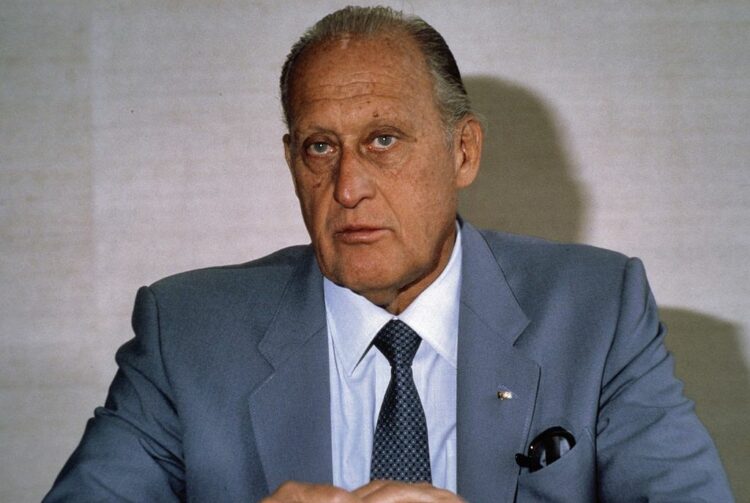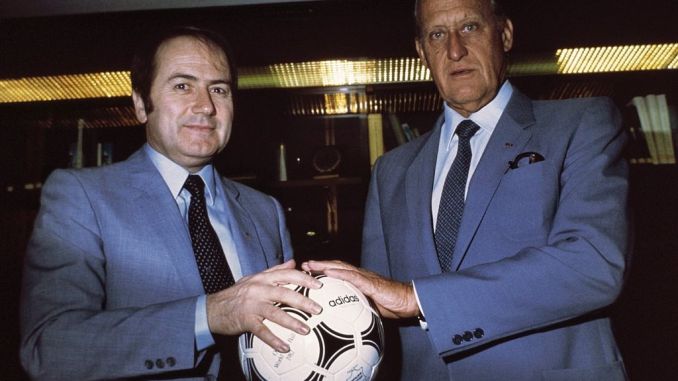
Introduction
João Havelange, a name synonymous with football administration, made an indelible mark on the sport during his tenure as the seventh President of FIFA. With a visionary approach and a focus on expanding the global reach of football, Havelange revolutionized the sport and shaped its future trajectory.
Sporting Tribune delves into the life, accomplishments, and controversies surrounding João Havelange, highlighting his significant contributions to international football.
Early Life and Sporting Career
João Havelange was born on 8 May 1916 in Rio de Janeiro, Brazil. He was born into a privileged family with Belgian roots. His father, Faustin Havelange, had immigrated from Liège, Belgium, to Brazil and worked as an arms dealer.
He developed a passion for sports at a young age, particularly excelling in swimming. Havelange represented Brazil in the 1936 Olympic Games, gaining recognition for his athletic prowess.
After completing his secondary education, Havelange gained admission to the esteemed Law School of Fluminense Federal University. He pursued his legal studies and successfully graduated at the age of 24 with a Bachelor of Laws degree.
Following his graduation, Havelange started his professional career as a legal advisor for Auto Viação Jabaquara, a bus company. He provided legal counsel and support to the company in various matters. Later, he assumed the position of president-director at Viação Cometa S/A, another bus company. In this role, Havelange held significant responsibilities in managing and overseeing the operations of the company.
In addition to his involvement in the transportation sector, Havelange was also a senior partner at Orwec Química e Metallurgia Ltda, a chemical and metallurgical company. This role showcased his business acumen and involvement in diverse industries.
However, it was his subsequent transition to football administration that would establish his enduring legacy.
ALSO READ: TRANSFER RUMOURS: Saka set for new £300k p/w deal, as Liverpool eye Barella
Presidency of FIFA
Havelange defeated Englishman Sir Stanley Rous for the presidency of FIFA in 1974, inheriting an organization facing financial difficulties and limited global influence. Determined to transform FIFA into a dynamic and globally recognized institution, Havelange implemented a series of groundbreaking initiatives.

Expansion of the World Cup
One of Havelange’s most significant achievements was the expansion of the FIFA World Cup. Under his leadership, the tournament grew from a competition involving 16 teams to one featuring 24 teams in 1982 and eventually 32 teams in 1998. This expansion not only provided opportunities for smaller nations to participate but also showcased the global appeal and inclusivity of football.
Commercialization and Sponsorship Deals
Havelange recognized the untapped commercial potential of football and sought to capitalize on it. He skillfully negotiated lucrative sponsorship deals for FIFA and the World Cup notably with Coca-Cola and Adidas, transforming the tournament into a highly profitable enterprise. These partnerships with major corporations elevated the financial standing of FIFA and opened new avenues for global exposure and growth.
Global Expansion and Development
Havelange believed in the power of football to transcend borders and unite nations. He spearheaded efforts to expand the sport beyond its traditional strongholds, focusing on developing football in emerging markets. Havelange supported the establishment of regional confederations, fostering the growth of football talent, infrastructure, and culture in Africa, Asia, and Oceania.
Legacy and Controversies
While Havelange’s tenure was marked by notable achievements, it was also marred by controversies that would cast a shadow over his legacy. In the later years of his presidency, allegations of corruption and bribery surfaced, tarnishing FIFA’s reputation.
ALSO READ: UCL: ‘The performance was good’ Ancelotti hails Rudiger for shutting down Haaland
One of the most significant controversies surrounding Havelange was his association with ISL, a Swiss marketing agency responsible for handling FIFA’s commercial rights. In the early 2000s, it was revealed that Havelange and his son-in-law, Ricardo Teixeira, had accepted bribes from ISL in exchange for granting them lucrative marketing contracts. The scandal tarnished FIFA’s reputation and raised serious questions about Havelange’s integrity.
Furthermore, during Havelange’s presidency, FIFA faced allegations of bribery and corruption in the bidding processes for the hosting rights of the World Cup. In particular, the selection of hosts for the 1998 World Cup (France) and the 2014 World Cup (Brazil) came under scrutiny. There were allegations of improper payments and vote-rigging, suggesting that Havelange may have been involved in such unethical practices.
Havelange’s presidency was also marked by allegations of nepotism within FIFA. He appointed his son-in-law, Ricardo Teixeira, as the head of the Brazilian Football Confederation (CBF) and supported him despite numerous allegations of corruption. This nepotism raised concerns about accountability and transparency within FIFA, contributing to the overall perception of a culture of corruption within the organization.
Additionally, Havelange faced criticism for his autocratic leadership style. He consolidated power within FIFA and made decisions without adequate transparency or consultation. Critics argued that this centralized power structure allowed corruption to thrive and hindered necessary reforms within the organization.
João Havelange was also associated with Castor de Andrade, a Brazilian criminal known for heading an illegal gambling association. In 1994, Andrade was sentenced to six years in prison for racketeering.
Earlier In 1987, Havelange wrote a character reference for Andrade, describing him as “amiable and pleasant,” with loyalty being his predominant feature. Havelange portrayed Andrade as a good family man, a devoted friend, and admired him as a sports administrator. The letter concluded with Havelange granting Andrade permission to use the statement as he saw fit.
During a police investigation into Andrade, authorities discovered this reference letter along with evidence that Andrade had provided Havelange with a box at the Rio Carnival.
This association between Havelange and Andrade, along with the character reference, raised significant concerns about Havelange’s judgment and ethics. It suggested a questionable relationship with a known criminal and cast doubt on Havelange’s integrity as a sports administrator.
Despite the controversies and allegations surrounding Havelange, it is important to note that he also oversaw significant advancements in FIFA’s global expansion. Under his leadership, the World Cup expanded from 16 to 32 teams, attracting a larger global audience and increasing the tournament’s commercial value. Havelange also worked to develop the sport in emerging markets, leading to increased participation and interest in football worldwide.
Health issues and death
In March and April 2012, João Havelange was hospitalized in Rio de Janeiro due to a severe infection in his right ankle. The seriousness of the condition required him to be placed in intensive care for a period of time.
In April 2013, Havelange resigned from his position as FIFA’s Honorary President, citing health and personal reasons. This marked the end of his official involvement with the organization.
Havelange’s health issues persisted, and he was admitted to the hospital again in June 2014, this time for a lung infection. Subsequently, in November 2015, he faced respiratory problems that necessitated another hospitalization.
Tragically, João Havelange passed away on 16 August 2016 in Rio de Janeiro. His death occurred during the 2016 Summer Olympics, which were being held in the city at the time.
Conclusion
João Havelange’s presidency of FIFA was a transformative era in the history of international football. His visionary leadership, expansion of the World Cup, and focus on global development propelled the sport to new heights. However, the controversies that surfaced during his tenure highlighted the importance of upholding integrity and transparency in football administration.
Despite these challenges, Havelange’s contributions to football’s global reach and development cannot be understated.






